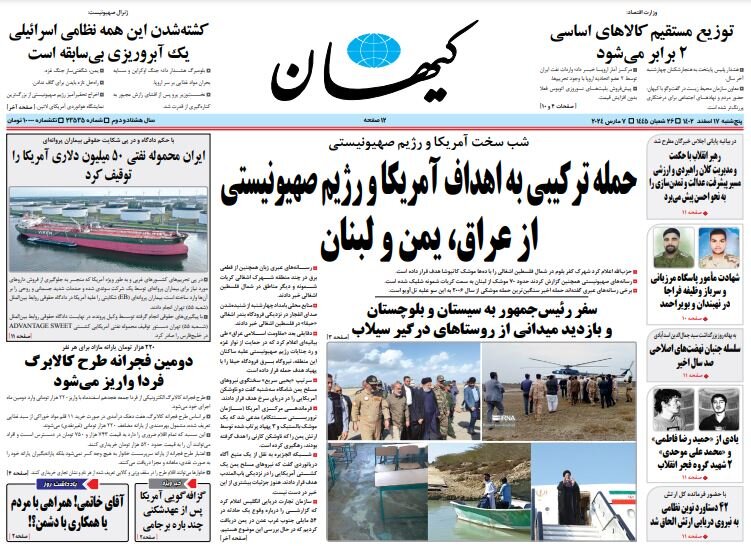America broke its JCPOA promise

TEHRAN - In a note, Kayhan discussed the statement of the U.S. representative in the International Atomic Energy Agency and said: The U.S. says that Iran should lower the concentration of all its 60% uranium reserves and completely stop the production of 60% uranium enrichment.
The insolence of the American side in the recent statement is that most of the limitations imposed were a voluntary measure in exchange for the promise of the United States and the European troika to cancel the sanctions in the JCPOA. Despite the gradual breach of promise by the Western side from the very beginning of the implementation of the agreement and then the complete withdrawal of the United States from the JCPOA in 2018, our country unilaterally implemented its obligations but the western side's perception of this action was Iran's weakness and the possibility of exerting more pressure. It is the Western side that must be responsible and compensate Iran for breaching its promise and causing massive damages, not the Iranian side, which implemented its commitments two months before the day of implementation of the JCPOA, and two years after the absolute violation of the agreement by America and the return of sanctions, still maintained voluntary nuclear limitations.
Iran: Europe's cold reaction to America by insisting on buying oil from Iran
In a commentary, the Iran newspaper pointed out the import of Iranian oil by an official member and an observer of the European Union and wrote: Despite the sanction on Iranian oil by the European Union, Bulgaria, as an official member of this union, has imported oil from Iran. Also, as an observer member of the European Union, Georgia imported 4,438 tons of oil or oil products from Iran last year. Changing the approach of selling oil to "marketing" in the crude oil business and not waiting for the completion or failure of negotiations, as well as the active performance of energy diplomacy, were among the reasons that caused the success of the 13th government in the development of production in the country's oil and gas sector. The 13th government promoted the development of the oil trade and was able to redesign the country's oil trade by assuming the permanence of sanctions and confrontation with Western sanctions. This incident shows the pressure of Iran's sanctions on the energy sector of EU members and the desire of these countries to ignore the sanctions against Iran.
Arman-e-Melli: The confrontation between Iran and America in the Persian Gulf
In a note, Arman-e-Melli addressed Iran's seizure of a $50 million oil shipment and said: Once again, the Persian Gulf witnessed a confrontation between Iran and the United States. Following the sanctions of Western countries and especially the United States, which led to the prevention of the sale of medicines needed for Epidermolysis Bullosa (EB) patients by a Swedish company, the International Relations Court of Tehran ordered the seizure of the American oil cargo of the ADVANTAGE SWEET ship in the Persian Gulf, and the cargo of this ship was seized. Alireza Taghavinia, a media activist and analyst of West Asia issues raised the question that which country in the world dares to use military force to seize an oil tanker carrying American cargo and have its judicial system issue a confiscation order? Iran's action in seizing the U.S. oil cargo worth 50 million dollars is a historical development that points out that America is no longer the world's superpower.
Hamshahri: Deterrence without closing the Strait of Hormuz
The geopolitical importance of the Persian Gulf and the Strait of Hormuz has caused Iran's naval forces, both in the army and the IRGC, to significantly increase Iran's deterrence level in this region by strengthening its strategic power. Now, Iran's maritime authority in the Strait of Hormuz has reached a level where experts consider the Islamic Republic to be the dominant power in the Strait of Hormuz because even without the need to block this strait, has the desired leadership ability to establish a strategic balance in this region. The seizure of the American oil cargo is proof of Iran's claim of deterrence power in the Strait of Hormuz. This is while this strait, as the world's energy export bottleneck, has become an arena for dealing with future threats in the field of naval warfare. In the past, observers of developments in the region emphasized that closing the Strait of Hormuz would be Tehran's only option to react to the hostile actions of Western governments. Now, however, Iran has shown that without closing the Strait of Hormuz, can protect its security and national interests.
Leave a Comment